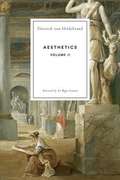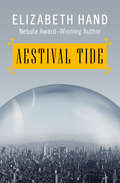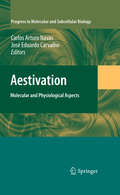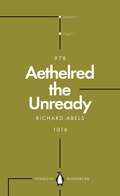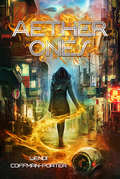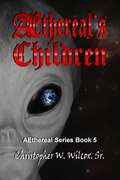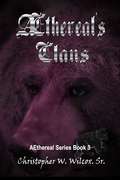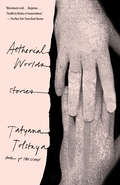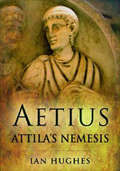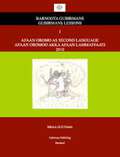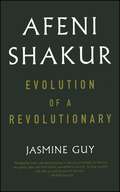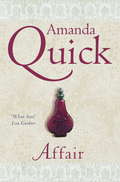- Table View
- List View
Aesthetics: Volume II
by Dietrich Von HildebrandWritten in the early 1970s during the last years of his life, as if harvesting a lifetime of reflection, Dietrich von Hildebrand's Aesthetics is a uniquely encompassing work.The first volume develops an original theory of the beautiful, and the second applies that theory with tremendous breadth and attention to the various types of artwork and to many of the world's most beloved works of art. <P><P> It is a testament to the work's broad significance that two of the most respected voices in contemporary aesthetics have joined together to offer forewords to each volume: Dana Gioia to Volume I, and Sir Roger Scruton to Volume II. <P><P> Sir Roger Scruton writes on Volume II: "In this second volume of his treatise on the subject Hildebrand assembles the results of a lifetime's thought about the arts, and expresses his devotion to beauty in terms that the reader will find immediately engaging." <P><P> He continues: "Most philosophers of aesthetics content themselves with a few examples from the realm of art, and make no attempt to explore the distinct disciplines or to catalogue all the parts that contribute to the overall aesthetic effect. One purpose of this second volume, however, is to show the completeness of the artistic enterprise, and the way in which it penetrates human life in its entirety, so that the idea of beauty enters our practical activity at every point." <P><P> Dietrich von Hildebrand's Aesthetics occupies a place in the great philosophical aesthetic tradition of Plato, Kant, and Hegel, while incorporating the fresh and fundamental insights of phenomenology. With this publication of the first English translation, Dietrich von Hildebrand becomes a contemporary spokesman and defender of the importance of beauty and aesthetic values at a time when many think that beauty is relative and art unnecessary.
Aestival Tide (The Winterlong Trilogy #2)
by Elizabeth HandElizabeth Hand's Winterlong trilogy continues: Welcome to ArabothIn Aestival Tide,Elizabeth Hand returns to the extraordinary Winterlong universe. In Araboth--the majestic, domed, multi-tiered city of the Ascendants--obsession with beauty and power vents in haunting, horrific ways. The resurrected Margalis Tast'annin has become the Aviator Imperator of the Ascendants, enslaved by his former lover and exiled to the debauched city of Araboth. And the city that was once home to an advanced society is now a shadow of its former self. Now, as the once-in-a-decade Aestival Tide approaches, the formerly great dome teeters on the brink of its own destruction. This ebook features an illustrated biography of Elizabeth Hand including rare images and never-before-seen documents from the author's personal collection.
Aestivation: Molecular and Physiological Aspects (Progress in Molecular and Subcellular Biology #49)
by José Eduardo Carvalho Carlos Arturo NavasNumerous animal species live in environments characterized by a seasonal reduction in the availability of water, which often but not always occurs when temperatures are highest. For many such animals, survival during the toughest season requires spending long periods of time in a rather inactive state known as aestivation. But aestivation is much more than remaining inactive. Successful aestivation requires the selection of a proper microhabitat, variable degrees of metabolic arrest and responsiveness to external stimuli, the ability to sense the proper time of year for emergence, the preservation of inactive tissue, and much more. So, aestivation involves a complex collection of behaviors, ecological associations and physiological adjustments that vary across species in their type, magnitude and course. This book seeks to explore the phenomenon of aestivation from different perspectives and levels of organization, ranging from microhabitat selection to genetic control of physiological adjustments. It brings together authors from across the world working on different systematic groups, approaches, and questions, but who are all ultimately working to better understand the complex issue of aestivation.
Aeternum Ray
by Tracy R. Atkins"Poverty, terrorism, murder, disease, homelessness, hopelessness, hunger and death; all cease to exist in 2049." Aeternum Ray is a sweeping, yet intimate story of mankind's next renaissance that will appeal to fans of visionaries Isaac Asimov, Gene Roddenberry and Ray Kurzweil. The novel is a collection of emotional personal letters written by 240-year-old William Babington to his newborn son Benjamin. Having lived a full life, William has experienced everything from death to his rebirth into the utopian Aeternum; an advanced computer system shepherded by the omnipotent artificial intelligence Ray. William pens the highlights of his existence, love, and loss while reflecting on the centuries of wonder he has witnessed firsthand. His humble letters form a detailed memoir that is intertwined with humanity's greatest triumphs, the technological singularity, and the solemn burden of surviving Earth's darkest night of terror. Through the light and dark times of the near future, Aeternum Ray departs from dystopian themes and brings back the uplifting notion of utopian speculative ideals.
Aethelred the Unready: The Failed King (Penguin Monarchs)
by Richard Abels'Æthelred's reign of nearly thirty-eight years was the longest of any Anglo-Saxon ruler. If he had died in AD 1000, history would have remembered him more kindly'Few monarchs of the Middle Ages have had a worse popular reputation than Æthelred II, 'the Unready', remembered as the king who lost England to Viking invaders. But, as Richard Abels shows, the failure to defend his realm was not entirely his alone. Æthelred was in many ways an innovative ruler but one whose challenges - a divided court, a fragile nascent kingdom, a voracious, hydra-headed enemy - were ultimately too great to overcome.
Aether Ones
by Wendi Coffman-Porter“A science fiction mystery with political upheaval and dangerous secrets. It’s got a kick-butt female lead and lots of really neat alien races.” —The Bookwyrm’s DenLong ago, the Great Sundering ripped the universe apart, creating two separate realities. The kuldain realm developed advanced technology, and its inhabitants travel the universe on massive ships to colonize and expand their empire. The aether realm, meanwhile, harnessed the magic of the massively powerful eldrich energy that connects everything within their realm.Now, a tentative peace reigns between the two realms, maintained by a treaty and by the Imperial Investigative Service—a force designed to monitor interactions between the realms and ensure that most kuldain inhabitants don’t even know aether space exists.Leilani Falconi, a talented agent of the IIS, polices the galaxy with quick sarcasm and a quicker temper. When a series of suspicious deaths in kuldain space threatens the secrecy and peace, Lei must solve the mystery—fast—before both her realities change forever.“Impressive and original world building . . . an entertaining read and a book which transported me to a fascinating and vivid universe.” —Facing the Story“Aether Ones with its incredible protagonist and refreshing take on a science fiction slash fantasy genre is a very engaging, fast-paced read.” —Lili’s Blissful Pages
Aetherbound
by E.K. JohnstonA thought-provoking new YA space adventure from the #1 New York Times bestselling author of Star Wars: Ahsoka.Set on a family-run interstellar freighter called the Harland and a mysterious remote space station, E. K. Johnston's latest is story of survival and self-determination. Pendt Harland's family sees her as a waste of food on their long-haul space cruiser when her genes reveal an undesirable mutation. But if she plays her cards right she might have a chance to do much more than survive. During a space-station layover, Pendt escapes and forms a lucky bond with the Brannick twins, the teenage heirs of the powerful family that owns the station. Against all odds, the trio hatches a long-shot scheme to take over the station and thwart the destinies they never wished for.
Aethereal
by Chris WilcoxThe investigation of a series of mysterious terrorist bombings leads Special Agents Judy Deavers and Eric Johansson into a secret world where myth and reality collide. What they discover is so explosive that it could tear the very fabric of the civilized world apart. The ultimate fate of humanity is in the balance and it is a race against time to stop the last clock from ticking down.
Aethereal Revealed
by Chris Wilcox"We are not now, nor have we ever been, alone on this planet." With those words, the President of the United States reveals to the world the existence of the Æthereal, the nearly immortal beings who serve as guardians against the Gray menace. Is humanity ready to share their world with real fire-breathing dragons? For many normal humans like Danny Trasker, their lives are turned upside down as they become partners with the Guardians. For terrorists, the revelation of the Æthereals is a call for jihad.
Aethereal Trilogy Megabook
by Chris WilcoxTHREE COMPLETE NOVELS, ONE MEGABOOK SERIES! The first three novels in the epic science fiction/fantasy series from Bestselling author Christopher W Wilcox Sr., including: Aethereal: The investigation of a series of mysterious terrorist bombings leads Special Agents Judy Deavers and Eric Johansson into a secret world where myth and reality collide. What they discover is so explosive that it could tear the very fabric of the civilized world apart. The ultimate fate of humanity is in the balance and it is a race against time to stop the last clock from ticking down. Aethereal Revealed: "We are not now, nor have we ever been, alone on this planet." With those words, the President of the United States reveals to the world the existence of the Æthereal, the nearly immortal beings who serve as guardians against the Gray menace. Is humanity ready to share their world with real fire-breathing dragons? For many normal humans like Danny Trasker, their lives are turned upside down as they become partners with the Guardians. For terrorists, the revelation of the Æthereals is a call for jihad. Aethereal's Clans: Spyder, the irreverent cyberpunk turned Head of the Guardian Science Support Staff, finds himself the de facto ambassador to the Ursars, a race of twenty-foot tall, telepathic and telekinetic purple bears. Forming unbreakable bonds with Korin, son of the Clan Father, Spyder soon finds there are some things that are worth more than your own life. Family, friends, and Clan, Spyder risks them all in a life-or-death struggle against the marauding Grays. GET THE COMPLETE FIRST THREE BOOKS OF THE SERIES IN THIS MEGABOOK RELEASE!
Aethereal's Children
by Chris WilcoxTwenty years have passed since the destruction of the Gray invasion fleet saved the worlds of the Pride; twenty years without a single sign of the Gray throughout the known universe. The lessening of tension has permitted the Guardians to focus on reclaiming the devastated planets. As the children of the Guardians come of age, a new and more deadly threat emerges. The unexplained loss of one hundred ninety-two Æthereal warriors brings them face to face with a new Gray species even as treachery and rebellion threatens the Guardian alliance, forcing them all to face the truth about their past, their present, and whether there will be a future. Genre: Science Fiction/Fantasy Read the entire bestselling AETHEREAL SERIES by Christopher W. Wilcox Sr.! AETHEREAL [The Aethereal Series Book 1] AETHEREAL REVEALED [The Aethereal Series Book 2] AETHEREAL'S CLANS [The Aethereal Series Book 3] AETHEREAL'S PRIDE [The Aethereal Series Book 4] AETHEREAL'S CHILDREN [The Aethereal Series Book 5]
Aethereal's Clans
by Chris WilcoxSpyder, the irreverent cyberpunk turned Head of the Guardian Science Support Staff, finds himself the de facto ambassador to the Ursars, a race of twenty-foot tall, telepathic and telekinetic purple bears. Forming unbreakable bonds with Korin, son of the Clan Father, Spyder soon finds there are some things that are worth more than your own life. Family, friends, and Clan, Spyder risks them all in a life-or-death struggle against the marauding Grays.
Aethereal's Pride
by Chris WilcoxWhen the Grays devastate the home world of the feline Guardian race called the Pride, a single family survives, rescued by the Æthereal. Resembling large lions and reared in a patriarchal society, can they adapt to the ways of the humans and Æthereals? Will the Ursars accept the addition of large predatory felines in their peaceful valley? When a much changed Spyder returns from near death to reveal the secret of the Ancients, the stage is set for a confrontation with the Grays.
Aetherial Worlds: Stories
by Tatyana TolstayaFrom one of modern Russia's finest writers, a spellbinding collection of eighteen stories, her first to be translated into English in more than twenty years.Ordinary realities and yearnings to transcend them lead to miraculous other worlds in this dazzling collection of stories. A woman's deceased father appears in her dreams with clues about the afterlife; a Russian professor in a small American town constructs elaborate fantasies during her cigarette break; a man falls in love with a marble statue as his marriage falls apart; a child glimpses heaven through a stained-glass window. With the emotional insight of Chekhov, the surreal satire of Gogol, and a unique blend of humor and poetry all her own, Tolstaya transmutes the quotidian into aetherial alternatives. These tales, about politics, identity, love, and loss, cut to the core of the Russian psyche, even as they lay bare human universals. Tolstaya's characters--seekers all--are daydreaming children, lonely adults, dislocated foreigners in unfamiliar lands. Whether contemplating the strategic complexities of delivering telegrams in Leningrad or the meditative melancholy of holiday aspic, vibrant inner lives and the grim elements of existence are registered in equally sharp detail in a starkly bleak but sympathetic vision of life on earth. A unique collection from one of the first women in years to rank among Russia's most important writers.
Aethiel-Dor
by Phillip O StanleyLord Vauthnir is dead! Unbeknownst to his subjects, the evil General, Mortune has plotted the assassination and set blame and bounty upon the head of the half-elf, Elirah Encathla. Meanwhile, having accepted a quest that may alter the fate of Aluedra Valley, Elirah rides with a band of warriors through lands wrought with danger. Though romance blossoms between her and the Captain of the elk-riders, their budding love may end in death. Satyrs attack the villages of the Northeast, while the hordes of the Goblin King assail the western elf-lands. In the midst of it all, the infamous ogre, Mul-Buck, terrorizes the countryside. With the elf-tribes divided as never before, Elirah must decide whether to leave Aluedra Valley to its fate or become the war-maiden they need, rallying all to the battle-cry of The Death-Flower--Aethiel-Dor! Aethiel-Dor is the second installment of The Blackrose, A Chronicle of the Elves series.
Aetius: Attila's Nemesis
by Ian HughesIn AD 453 Attila, with a huge force composed of Huns, allies and vassals drawn from his already-vast empire, was rampaging westward across Gaul (essentially modern France), then still nominally part of the Western Roman Empire. Laying siege to Orleans, he was only a few days march from extending his empire from the Eurasian steppe to the Atlantic. He was brought to battle on the Cataluanian Plain and defeated by a coalition hastily assembled and led by Aetius. Who was this man that saved Western Europe from the Hunnic yoke? While Attila is a household name, his nemesis remains relatively obscure.
Aetna and the Transformation of Health Care
by Rebecca Henderson Russell A. Eisenstat Matthew PrebleMark Bertolini, chairman and CEO of the health insurer Aetna, faces a number of questions as he seeks to transform Aetna from a classic insurance company into a business that will engage much more deeply with its members around their personal health goals. His strategy depends on Aetna’s ability to facilitate behavioral changes amongst its members to live healthier lives and requires very significant investments in digital capabilities and on-the-ground community-orientated health care resources. Will it work? Can he implement it? The case explores both the strategic issues inherent in this potential transformation and the organizational and leadership questions that it raises. Bertolini is a highly purpose-driven leader, and the case allows for a rich discussion of the degree to which this changes both his strategic and his organizational options.
Afaan Oromo As Second Language
by Ibsaa GuutamaThe earliest registered civilization is probably the civilization of Cushitic speaking peoples spearheaded by ancient Egypt. The Oromo are of the Cushitic speaking stock. Missing links of that civilization are hoped to be found in the language and culture of the Oromo nation of East Africa. It is not too late for researchers of ancient civilizations to turn their attention towards East Africa, specifically Oromia. The first step towards this may be learning their language. This little book will offer you that opportunity. It is presented in a possible easy but sure way to help you understand its basics.
Afeni Shakur: Evolution Of A Revolutionary
by Jasmine GuyBefore becoming one of the most well-known members of the Black Power movement, Alice Faye Williams was not unlike any other poor, African American girl growing up in the impoverished South. But when her family moved to New York during the radical sixties, she became intoxicated by the promise of social change. By the time she turned twenty-one, Alice had a new name -- Afeni Shakur, derived from the Yoruba term for "lover of people" -- and a new vision for the future. The rest is history. In 1969, Afeni was arrested along with other members of the Black Panther party on 189 felony charges that included 30 counts of conspiracy. Though she was eventually acquitted of the charges, Afeni spent eleven months in jail before being released. Once on bail, she became pregnant with a son: Tupac Amaru Shakur, a rap megastar until his tragic death in 1996. In this searing work, renowned actress and Afeni's trusted friend Jasmine Guy reveals the evolution of a woman through a series of intimate conversations on themes such as love, death, race, drugs, politics, music, and of course her son. Filled with startling revelations and heartbreaking truths, Afeni's memoir is a powerful testament to the human spirit and the perseverance of the African American people.
Affair
by Amanda QuickCharlotte Arkendale knew all there was to know about men. After all, she'd made a career out of steering marriage-minded women away from untrustworthy members of the opposite sex.Yet nothing could have prepared her for Baxter St. Ives - an arresting stranger too daring, too determined, too dangerous to be her new man-of-affairs. Still, perhaps he was the perfect person to help Charlotte investigate the recent murder of one of her clients. So she gave him a chance, never realising that Baxter, a gifted scientist, would soon conduct a risky exploration into the alchemy of desire, with Charlotte as his subject. But even as he sets out to seduce Charlotte, a twisted killer lies in wait, ready to part the lovers ...or see them joined together forever - in death.
Affair of Pleasure
by Lindsay EvansThe one worth waiting for... Childhood neighbors and friends turned business partners, Nichelle Wright and Wolfe Diallo make a successful management consulting team. Yet Nichelle knows charming ladies' man Wolfe too well to want anything more. Until wooing a lucrative new client requires them to masquerade as husband and wife. And with one heated glance across a Parisian hotel room, "strictly platonic" explodes in an inferno of long-denied desire. For years, Wolfe has kept sexy, ambitious Nichelle on a pedestal. Suddenly she's in his bed, and for the first time he's the one wanting more. Playing at man-and-wife is all too satisfying-until a business rival plants seeds of mistrust. Wolfe knows he and Nichelle can never be just friends again. Is this the end, or a smoldering new beginning?
Affair with the Rebel Heiress
by Emily MckayBuying up her company hadn't been his original plan. But when Texas businessman Ford Langley researched his mystery lover, he discovered Kitty Biedermann was heiress to a jewelry empire ripe for the picking. It was the perfect opportunity for Ford to move boardroom discussions into the bedroom. There was just one issue: Kitty wasn't about to fall into his arms and thank him. She was determined to fight tooth and nail for her company--but would she be prepared for his takeover tactics? --This text refers to the Kindle Edition edition.
Affair-Proof Your Marriage: Understanding, Preventing and Surviving an Affair
by Lana StaheliThis singular guide presents the straightforward facts on affairs, as well as advice to affairees and spouses on how to cope with them.Since 60% of marriages are affected by affairs, you should know the facts:Women under 30 are as likely as men to have an affair.Love affairs are different from sex affairs.Most affairs last between and three years, but the consequences can last a lifetime.Fewer than 10% of affairees divorce their spouses then marry their lover.Over 75% of those who do divorce and marry their lover divorce again.Nearly 80% of those who divorce during an affair are sorry later.Most marriages survive affairs. If you want to stay married, you can.Prevention works. You can -- and should -- affair-proof your marriage right now.
Affair: A Novel
by Amanda QuickCharlotte Arkendale knew all there was to know about men. After all, she'd made a career out of steering marriage-minded women away from untrustworthy members of the opposite sex.Yet nothing could have prepared her for Baxter St. Ives--an arresting stranger too daring, too determined, too dangerous to be her new man-of-affairs. Still, perhaps he was the perfect person to help Charlotte investigate the recent murder of one of her clients. So she gave him a chance, never realizing that Baxter, a gifted scientist, would soon conduct a risky exploration into the alchemy of desire, with Charlotte as his subject.But even as he sets out to seduce Charlotte, a twisted killer lies in wait, ready to part the lovers...or see them joined together forever--in death.From the Paperback edition.
Affaire Royale: Cordina's Royal Family (Cordina's Royal Family #1)
by Nora RobertsWith Her Serene Highness Gabriella suffering from amnesia and her kidnappers still on the loose, Prince Armand lost no time in calling his close friend, American detective Reeve MacGee. Poor Brie could remember nothing; even her family were strangers to her. With Reeve's prodding, her memory began to awaken. But his warm heart and calming eyes awakened so much more.
